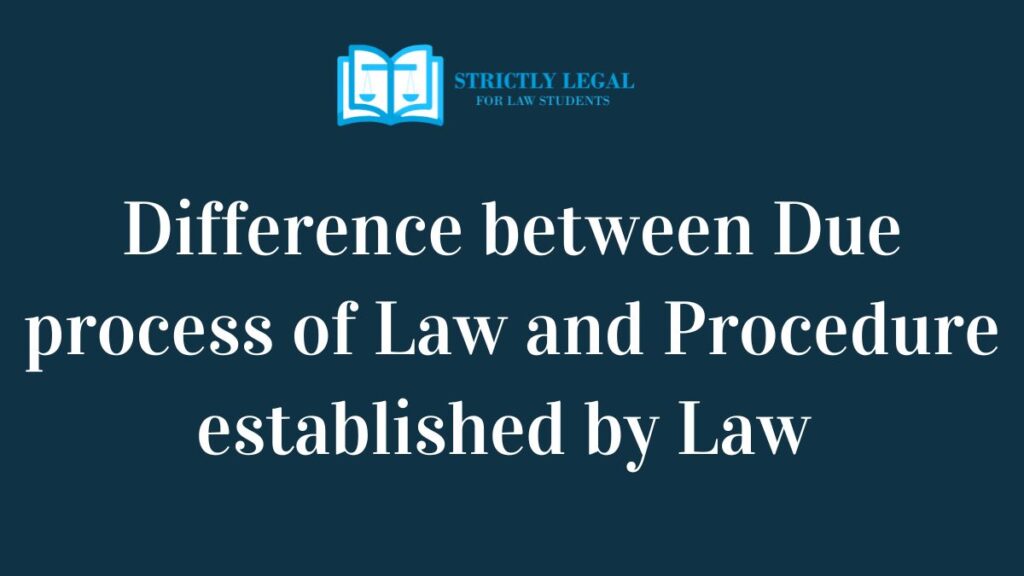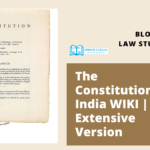The ‘Procedure established by law’ is the properly enacted law by the legislature which is justifiable when it acts in accordance with the procedure and requirements. The ‘Due process of law’ is an American phenomenon from Clause 39 of the Magna Carta that was endorsed in the United States of America. The Constituent Assembly evidently used the term ‘Procedure Established by law’ in the draft of Article 15 after a conversation with the Advisor of the Constituent Assembly, Sir B.N. Rau had with Frankfurter J. of the United States of American Supreme Court who stated that due process clause is authoritarian and burdensome to the judiciary because it empowered judges to contradict the legislation enacted by the majorities of the democratic. The Constituent Assembly then attempted to ignore the term ‘due’ that created peculiarity and non-uniformity in the USA and nourished the judiciary as well as the legislature. The predilection of ‘procedure established by law’ as distinctive with the constituent debate was to give parliamentary superiority in the law making with ample constitutional and judicial protection for ‘personal liberty against the judicial superiority. The constituent assembly kept the superiority of the legislature predominant. In Gopalan’s case, the majority favored the strict and literal interpretation of Article 21. The court’s point of view was negative and influenced by the imperative theory of law. The court’s attitude, however, was somewhat liberalized in the Bank Nationalization case.
Table of Contents
Intimation of the Procedure Established by Law
In our country, the concept of ‘Procedure Established by Law’ refers to the procedure written down by a statute or procedure prescribed by the law of state. The query of the implementation of ‘procedure established by law’ after the emergence of the Constitution in 1950 in the A.K Gopalan v State of Madras, the words used under Article 21 came under the purview of the Honorable Apex Court in which the constitutionality of the Preventive Detention Act, 1950 was challenged. It was contended that ‘lex’ is no way the same as ‘jus’ so the laws which were enacted by the legislature can be tested on the standard of suitableness and principles of natural justice which were fuzzy, indefinite, and faint. The methodical approach of the constitution was adopted where Article 19, Article 21, and Article 22 were exclusive altogether. It was a carte blanche to arrest a person without any procedural safeguards. The way Article 21 was implemented made it powerless against legislative power which could make any law, however drastic, to impose restraints on personal liberty without being obligated to lay down any reasonable procedure for the purpose. It was not for the court to judge if the law provided was a fair or reasonable procedure or not.
Likewise, in Ram Singh v. State of Delhi, a person was held up under the Preventive Detention Act, 1950 for making speeches detrimental to the maintenance of public order. During that time, Article 19 (2) did not mention any restrictions on freedom of speech in the name of ‘public order’. Hence, freedom of speech could not be prohibited on the said ground. But the honorable Court issued a preventive detention order on the ground of making speeches detrimental to the maintenance of public order.
The judgement of the Bank Nationalization Case was diverged from the traditional rigid positivism and was concerned to safeguard the right to protect property with the right to personal freedom. The court interlinked Article 31 (2) along with Article 19 (1) (f) and placed the substructure linked between Article 19, 21 and 22.
Effect of Due Process of Law on the Criminal Judicial System
The elimination of the Judiciary from the extrajudicial matters and the movement of judicial activism led to the intensification of not only the constitutional jurisprudence but also the criminal jurisprudence. The casual implementation of the broadest magnitude of the term ‘procedure established by law’ gave flesh and blood to the life and personal liberties within the ambit of Article 21.
In the case of Francis Coralie Mullin v Union Territory of Delhi, it was contended that “Now obviously, any form of torture or cruel, inhuman or degrading treatment would be offensive to human dignity and constitute an inroad into this right to live and it would, on this view, be prohibited by Article 21 unless it is in accordance with the procedure prescribed by law, but no law which authorizes and no procedure which leads to such torture or cruel, inhuman or degrading treatment can ever stand the test of reasonableness and non-arbitrariness: it would plainly be unconstitutional and void as being violative of Articles 14 and 21. It would thus be seen that there is implicit in Article 21 the right to protection against torture or cruel, inhuman or degrading treatment…”
In Hussainara Khatoon v. Home Secretary, State of Bihar, the Honorable Court contended that although the concept of speedy trial is not certainly mentioned in the Constitution of India, it is understood in the broad sweep and contents of Article 21 as implemented in the case of Maneka Gandhi v. Union of India.
In Selvi v. the State of Karnataka, it was observed that the narcs-analysis test, lie detector test, polygraph test, and brain mapping without the prior involuntary management and consent of the subject are constitutionally invalid. He drew a kinship between the right against self-incrimination and the promise of a fair trial by entreating the idea of ‘due process of law’.
Conclusion
The judiciary provided a slender and automated meaning and winged positivism, imperative theory of law and parliamentary superiority. Judiciary was a living argent tower unconnected and unconcerned with the social realm, conquering the values of natural justice and rule of law. It accepted the original intent and the meaning of ‘procedure established by law’ in a restricted fashion as promulgated by the constitution framers by relying on the advice of Justice Frankfurter. The implication of the former doctrine in the pre-emergency era compromised with the civil liberties as there was no appeal to natural justice. The reluctance and timid fashion of the judiciary can be manifested in the mechanical interpretation and application of the enacted laws with the preference for the security of the state vis-à-vis individual life and rights. But it would not be correct to say that Article 21 is of no use as it constituted restriction upon the arbitrary and ultra vires decisions of the executive. But the fallacy of Article 21 lies in the impotency of the legislative powers to enact any law against the principles of natural justice and rule of law without any power to the judiciary to question o to review it.

Law student.
Turning legal insights into engaging narratives.





